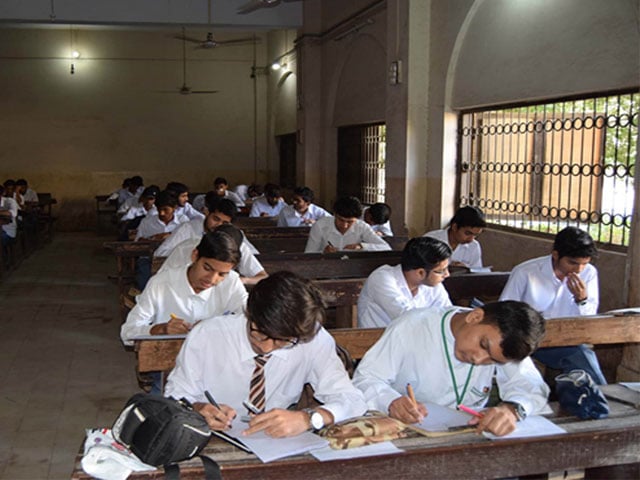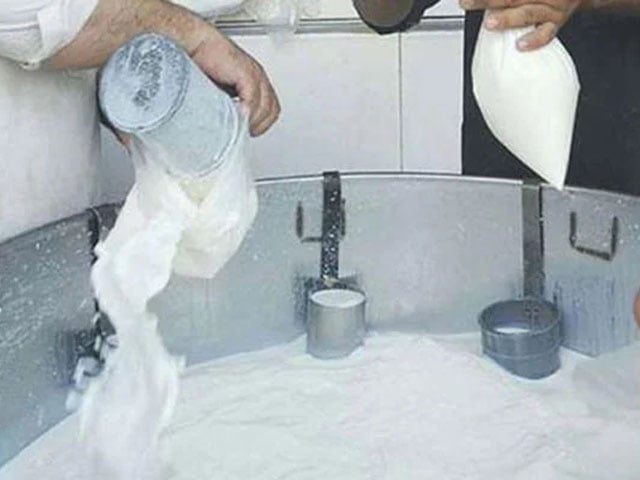Karachi: Due to the fact that the major decisions made regarding changes in matriculation and intermediate examination system and scheme of studies in Pakistan have not been applied at the Sindh level, this province has lagged behind in adopting innovation, and the decisions made regarding innovation in teaching and examinations have not been implemented in Sindh. Due to non-implementation at the level of education boards, students of the entire province including Karachi have not been able to benefit from these decisions.
“Annaul 2” instead of supplementary (supplementary) examinations at matriculation and entrance level, alternative quiz system to practical examinations or practical examination, facility of matric science for private knowledge and facility of giving subject examinations of two different faculties at the same time. There are more decisions, most of which have been implemented in the Federal Board, several Punjab Education Boards and the KPK Board.
The private Ziauddin Board in Sindh has also implemented some decisions last year while some have been implemented recently, but none of the above decisions have been implemented in any official education board of Sindh and the education boards of Sindh have outdated or traditional system of examinations and scams. Lakhs are being passed through the examination process under studies.
The chairmen of education boards of Sindh are not only aware of these decisions, but they are also indifferent to their fruits because when the above decisions were made in the “Interboard Chairman’s Commission” (IBCC) at the federal level, then the chairmen were not aware of these decisions. were present in these meetings and to be a part of the decision, however, they did not make any preparations regarding these decisions in the education boards established in their respective districts, nor did they announce them.
Secretary IBCC Dr. Ghulam Ali Malah says in this regard that the examination board in Sindh presents its decisions regarding the examination in the “Steering Committee” consisting of stakeholders under the Minister of Education of the province and these decisions may also be presented in this committee.
He said that at different times we have also written letters to the boards of Sindh regarding the application of the above decisions so that these decisions can be implemented for Sindh as well.
Dr. Malah confirmed that the Federal Board and several boards of Punjab have implemented most of the decisions. Meanwhile, sources say that none of the above-mentioned decisions have been presented for discussion in the steering committee meetings, while other educational boards of the country are adopting these systems by implementing the decisions, but Sindh is not becoming a part of this uniform policy.
It should be noted that the educational boards of Sindh have been suffering from the worst conditions at the administrative level during the tenure of the PPP government for the past several years and now under the caretaker provincial government.
Since Chairman Boards are appointed on the basis of recommendation and influence rather than merit, therefore the effects of these appointments come directly on strategy and decision-making because Sindh chairmen have no interest in these decisions.
It should be noted that at present in Sindh there are no chairman, secretaries and administrators of examinations after the dismissal of key positions in three major education boards “Interboard Karachi, Sindh Board of Technical Education and Nawabshah Board” and the respective deputy commissioners have been given the charge of these education boards. Other educational boards, including Mirpurkhas, Hyderabad and Khar, could not remove their chairmen from the Sindh Congress because they themselves managed to establish their influence over the chief minister.
Most of these chairmen of education boards were appointed on ad hoc basis on recommendation basis in the previous regime who never took interest in the changes in the scheme of studies and examination system in IBCC.
It should be noted that before the education boards of Sindh used to be under the Governor of Sindh till 2018, however, by changing the act, its controlling authority was given to the Chief Minister of Sindh.
The former Chief Minister of Sindh handed over the control of these boards to the concerned minister, Universities and Board, after which an unstoppable series of degradation started which has not stopped till now.
Education experts and a former chairman of the Hyderabad Education Board, Dr. Muhammad Memon, regarding the situation of the education boards of Sindh and the non-implementation of better decisions in the province, says that there is a problem of policy direction and policy ad hocism in Sindh. have taken several initiatives regarding IBCC, including question bank and automation, in addition to the above-mentioned important decisions of IBCC.
He said that the boards of Punjab have thought about what we have to do, while our boards still do not have a policy direction. In Sindh, education quality is talked about, but examination quality is not talked about. There is no coordination among the boards of Sindh and the concerned department “Universities and Boards” is also not guiding.
Dr. Memon said that when he was the chairman of the Hyderabad Board, there was regular focus on the implementation of IBCC decisions. Children are being harmed.
It should be noted that all the relevant decisions have been taken by IBCC during the last two to two and a half years, at that time Dr. Saeeduddin was appointed in Inter Board Karachi for about three years and Barakat Hydari was appointed in Mirpurkhas Board.
Barakat Hydari was also in charge of the Hyderabad Board for a long time, while Dr. Masroor Sheikh was in charge of the Technical Board and Dr. Farooq Hassan, the Vice Chancellor of the Nawabshah Board, and Prof. Sharaf Ali Shah was in charge of the Matriculation Board in Karachi. No action has been taken from any side to implement these important decisions.
On the other hand, “Express” inquired about these matters from the Secretary Universities and Boards Noor Samu and asked him why Sindh was lagging behind in the implementation of these better decisions. If they come on merit, this work will also be done.
It should be noted that at the IBCC level, about two years ago, the titles of supplementary examinations at matric and intermediate levels were abolished in the entire country, including Sindh, and replaced by “Annual One and Annual Two” similar to A and A level. .
According to this decision, if they do not succeed in some papers in the annual examinations held in May and June, or for the improvement of division, they will participate in the examinations held in November or December again, their respective examinations will be called annual examinations instead of supplementary. And their mark sheet will be issued with annual toke title instead of supplementary.
In this way, the student’s career will not be affected by the supplementary exams, moreover such candidates could also directly participate in these exams who could not give the annual one exams for any reason, but on the contrary, for the last two years, matriculation has been held all over Sindh including Karachi. And the other exams of the entrance year are still being conducted under the name of Supplementary Examinations or Supplementary Examinations.
Similarly, in the presence of the chairmen of education boards of Sindh, another important decision was related to the matriculation of private candidates in science.
Moreover, some time ago, at matriculation and entrance level, the authority has also been given to the Cambridge Board, that they can simultaneously choose the subjects of different faculties of science or of a separate faculty and give them an examination. A Mathematics student can also appear in Biology in the same year.
In this regard, full working has been done at the level of IBCC and now letters are being written to the universities in this regard that they should look at such cases at the time of admission. None of the education boards have taken steps to implement this most important decision.
While in this context, an important decision was also made that since practical experiments are not conducted in some situations, so instead of practical, if the student wants, he can give quiz exams from the same syllabus. No preparation was done.
Apart from this, a very big and important decision has also been made at the national level regarding the change of grading system, this decision is to be implemented in phases from the examination results of the ninth and eleventh classes of the year 2024. If qualified and educated people are not appointed on merit, these decisions will remain in the files in the form of “minutes” at the Sindh level.
(function(d, s, id){
var js, fjs = d.getElementsByTagName(s)[0];
if (d.getElementById(id)) {return;}
js = d.createElement(s); js.id = id;
js.src = “//connect.facebook.net/en_US/sdk.js#xfbml=1&version=v2.3&appId=770767426360150”;
fjs.parentNode.insertBefore(js, fjs);
}(document, ‘script’, ‘facebook-jssdk’));
(function(d, s, id) {
var js, fjs = d.getElementsByTagName(s)[0];
if (d.getElementById(id)) return;
js = d.createElement(s); js.id = id;
js.src = “//connect.facebook.net/en_GB/sdk.js#xfbml=1&version=v2.7”;
fjs.parentNode.insertBefore(js, fjs);
}(document, ‘script’, ‘facebook-jssdk’));


